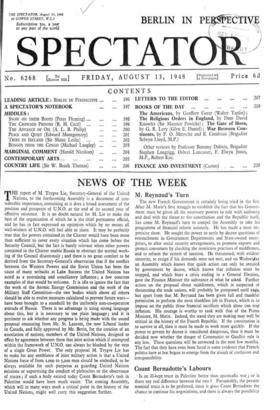M. Reynaud's Turn
The new French Government is certainly being tried in the fire. After M. Marie's first struggle to establish the fact that his Govern- ment must be given all the necessary powers to rule with authority and deal with the threat to the constitution and the Republic itself, has come M. Reynaud's turn to compel the Assembly to take his programme of financial reform seriously. He has made a most im- pressive show. He sought the power to settle by decree questions of retrenchment in Government Departments and State-owned enter- prises, to alter social security arrangements, to promote exports and protect consumers by checking the restrictive practices of middlemen, and to reform the system of taxation. He threatened, with evident sincerity, to resign if his demands were not met, and on Wednesolay an Assembly which knows that quick action can only be secured by government by decree, which knows that inflation must be stopped, and which fears a crisis ending in a General Election, gave the Finance Minister the substance of what he asked. Further action on the proposal about middlemen, which is suspected of threatening the trade unions, will probably be postponed until 1949, but apart from that M. Reynaud has been given full and thankful permission to perform the most thankless job in France, which is to impose on the public those financial sacrifices which alone can stop inflation. His courage is worthy to rank with that of the Prime Minister, M. Marie. Indeed, the stand they are making may well be critical in the history of the Fourth Republic. If the constitution is to survive at all, then it must be made to work more quickly. If the power to govern by decree is considered dangerous, then it must be decided now whether the danger of Communist or Gaullist rule is any less. These questions will be answered in the next few months. The fact that they have even been faced is some evidence that French politics have at last begun to emerge from the slough of confusion and irresponsibility.


































